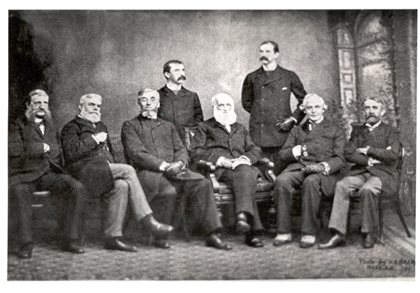The first week of January is a big deal for historians, especially those of the academic persuasion. This past weekend, January 2-5, the American Historical Association (AHA) held their 129th annual meeting in New York City.
The AHA is the granddaddy of American historical societies. It was founded in 1884 partly to establish professional standards for history as an academic discipline. The founders were also interested in collecting and preserving historical documents, teaching history and encouraging new historical research. From the beginning, academic papers have been presented at their annual meetings.

Executive officers of the American Historical Association at the time of the Association’s incorporation by Congress, photographed during their annual meeting on December 30, 1889 in Washington Seated (L to R) are William Poole, Justin Winsor, Charles Kendall Adams (President), George Bancroft, John Jay (Died 1829?), and Andrew Dickson White, Standing (L to R) are Herbert B. Adams and C. W. Bowen. This photo appeared in the February 1890 issue of the Magazine of American History. The Photographer was from M.B. Brady Studio.
Today the AHA is the oldest and largest society of historians in the United States. Their official publication is The American Historical Review, an academic peer reviewed journal established in 1895 and now published by Oxford University Press. Their other publication is Perspectives on History, a newsmagazine concerned with the discipline of history rather than the publication of new research.
The AHA website is a treasure trove of free articles and directories. It also includes a blog, career resources for historians, professional standards, membership information, a wiki about historical archive holdings, and information about AHA awards, prizes and fellowships.
But today I want to talk about the annual meeting. With 128 years of experience, they know how to organize a meeting. They had sponsors, exhibits, affiliated associations, a job fair, and tours highlighting the history of the host city, New York City. The theme for this year was History and the Other Disciplines and you can view the full program here. If you click on any of the days you can see a full listing of program offerings. Click into any of those listings for a full description and list of presenters.
This is incredibly valuable information to anyone interested in current scholarly research. For example, if you are a writer or reader of historical fiction, there was a panel session called Historians Writing Fiction: Inside the Academy and also its counterpart, Historians Writing Fiction: Outside the Academy.
Here is a small sampling of sessions to show you the diversity available.
- Indigenous Revolutions, 1700-1850
- The Allure of the Judicial Archives: Writing the History of Slavery through Case Files, Dockets, and Silences
- The Thematic Approach to Teaching World War I
- Making History “Popular”: Challenges and Opportunities in the College Classroom
- Tipping in American History
- Mexico in the Global 1960s
- Pirates, Collaborators, Students, and Martyrs: Nationalism and the Memory of War in Modern China
- Struggles for Institutionalized People’s Rights in Mental Health and Corrections
- American Religion Online: How Digital Projects Can Change How We Teach, Research, and Interpret Religious History
- The Triangle Shirtwaist Factory Fire: A Century of Protest Art
- Food and History: Setting the Table for an Interdisciplinary Discussion
- Themes in the History of Polish Music
- The History of Engineering and the Engineering of History
- Whispers in the Archive: Rumor and Gossip as Primary Sources
- Investigating the Cold War in South Asia: Diplomacy and Security after Empire
If you are interested in any of these topics, or any of the many others listed on the meeting website, please check out the authors presenting the papers or participating in panel discussions. Historians generally specialize, so chances are the speakers have already published something on that topic.
I like to watch videos and read articles from the AHA general meetings, so I go to George Mason University’s History News Network, also known as HNN. I highly recommend joining their mailing list. A couple of times a week you’ll get an email with the top stories not only about history, but also about historians.
I mentioned another historical society in a previous post, the Detroit Drunken History Society. Although both groups are about history, the differences between them perfectly illustrates that if you are interested in history, there is something for everyone.
